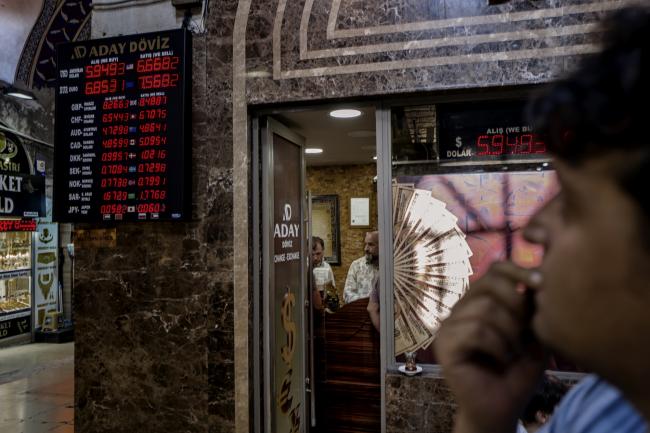(Bloomberg) -- Turkish regulators took another step to help the battered lira, making it harder for banks to short the currency through the swap market.
The Ankara-based Banking Regulation and Supervision Agency, known as BDDK, said on Wednesday that the total amount of foreign currency and lira swap and swap-like transactions can’t exceed 25 percent of banks’ legal shareholder equity. A 50 percent limit had been imposed on Monday.
The lira rose for a second day, jumping as much as 7 percent against the dollar and recovering some of the losses this month triggered by tensions with the U.S. Those tensions have been centered on a dispute over the detention of an American pastor, which resulted in tariffs and sanctions. The dispute exacerbated existing concerns about President Recep Tayyip Erdogan’s unorthodox approach to economic policy.
The plunge in the lira on Monday extended its losses against the dollar this year to more than 40 percent -- more than any other emerging market and major currency. On Monday, the central bank promised “all necessary measures” to maintain financial stability, but didn’t specifically mention higher interest rates and hasn’t raised them yet, even though Turkish corporate and banking executives have asked it to.
Financial Strength
Wednesday’s move came a day after the banking watchdog took an unconventional step to support the nation’s beleaguered banks, temporarily excluding the effect of day-to-day securities losses on how their financial strength is calculated.
The suspension of mark-to-market calculations on capital adequacy ratios will continue until prices of securities “normalize,” the banking regulator said in a document sent to banks on Tuesday. The "recent speculative volatility in markets" caused an “unfair erosion" in banks’ capital strength, it said. Under mark-to-market accounting, portfolios must reflect assets’ current market values rather than their book values.
The average capital adequacy ratio of the banking system stands at 16 percent as of the end of June, according to official data. Every 10 percent decline in the lira reduces capital adequacy ratios by around 50 basis points on average, according to a Goldman Sachs (NYSE:GS) report published on Aug. 6.
Loan Restructurings
Separately, the BDDK published a new set of regulations on loan restructurings by banks, financial leasing and factoring firms in the Official Gazette on Wednesday.
The new rules make it possible for lenders to extend the maturities of outstanding loans to clients, refinance them, make new loans to help troubled companies, and seek new collateral. Banks can also demand debtors sell assets to repay debts and improve their finances. Overdue loans can now be restructured within two years from the day a framework agreement is signed.
